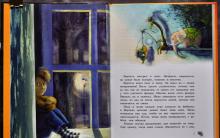"is the most vibrant and complex female character. Getting to know her as a young, only developing girl, the reader sees her gradual maturation and revelation as a woman, mother, and independent person. Wherein full characteristics the image of Olga in the novel “Oblomov” is possible only when working with quotes from the novel that most succinctly convey the appearance and personality of the heroine:
“If she were turned into a statue, she would be a statue of grace and harmony. The size of the head strictly corresponded to a somewhat tall stature; the size of the head corresponded to the oval and size of the face; all this, in turn, was in harmony with the shoulders, and the shoulders with the body...”
When meeting Olga, people always stopped for a moment “before this so strictly and thoughtfully, artistically created creature.”
Olga received good upbringing and education, understands science and art, reads a lot and is in constant development, learning, achieving new and new goals.
These features of hers were reflected in the girl’s appearance: “The lips are thin and mostly compressed: a sign of a thought constantly directed at something. The same presence of a speaking thought shone in the vigilant, always cheerful, unmissing gaze of dark, gray-blue eyes,” and unevenly spaced thin eyebrows created a small fold on the forehead “in which something seemed to say, as if a thought rested there.” Everything about her spoke of dignity, inner strength and beauty: “Olga walked with her head tilted slightly forward, resting so slenderly and nobly on her thin, proud neck; she moved her whole body evenly, walking lightly, almost imperceptibly.”
Love for Oblomov
The image of Olga Ilyinskaya in “Oblomov” appears at the beginning of the novel as still very young, little knowledgeable girl, with wide with open eyes looking at the world around us and trying to understand it in all its manifestations. The turning point, which became for Olga a transition from childhood shyness and a certain embarrassment (as was the case when communicating with Stoltz), became love for Oblomov. The wonderful, strong, inspiring feeling that flared up between the lovers with lightning speed was doomed to parting, since Olga and Oblomov did not want to accept each other as they really are, cultivating in themselves a feeling for semi-ideal prototypes of real heroes.
For Ilyinskaya love to Oblomov was connected not with those feminine tenderness, softness, acceptance and care that Oblomov expected from her, but with duty, the need to change inner world beloved, make him a completely different person:
“She dreamed of how she would “order him to read the books” that Stolz left, then read newspapers every day and tell her the news, write letters to the village, complete a plan for organizing the estate, get ready to go abroad - in a word, he would not fall asleep with her; she will show him a goal, make him love again everything that he has stopped loving.”
“And she will do all this miracle, so timid, silent, whom no one has listened to until now, who has not yet begun to live!”
Olga's love for Oblomov was based on the heroine's selfishness and ambitions. Moreover, her feelings for Ilya Ilyich are difficult to name true love- it was a fleeting love, a state of inspiration and rise before the new peak that she wanted to achieve. For Ilyinskaya, Oblomov’s feelings were not really important; she wanted to make him her ideal, so that she could then be proud of the fruits of her labors and, perhaps, remind him later that he owed everything he had to Olga.
Introduction
Olga Ilyinskaya in Goncharov’s novel “Oblomov” is the most striking and complex female character. Getting to know her as a young, only developing girl, the reader sees her gradual maturation and revelation as a woman, mother, and independent person. At the same time, a complete description of Olga’s image in the novel “Oblomov” is possible only when working with quotes from the novel that most succinctly convey the appearance and personality of the heroine:
“If she were turned into a statue, she would be a statue of grace and harmony. The size of the head strictly corresponded to a somewhat tall stature; the size of the head corresponded to the oval and size of the face; all this, in turn, was in harmony with the shoulders, and the shoulders with the body...”
When meeting Olga, people always stopped for a moment “before this so strictly and thoughtfully, artistically created creature.”
Olga received a good upbringing and education, understands science and art, reads a lot and is in constant development, learning, achieving new and new goals. These features of hers were reflected in the girl’s appearance: “The lips are thin and mostly compressed: a sign of a thought constantly directed at something. The same presence of a speaking thought shone in the vigilant, always cheerful, unmissing gaze of dark, gray-blue eyes,” and unevenly spaced thin eyebrows created a small fold on the forehead “in which something seemed to say, as if a thought rested there.” Everything about her spoke of her own dignity, inner strength and beauty: “Olga walked with her head tilted slightly forward, resting so slenderly and nobly on her thin, proud neck; she moved her whole body evenly, walking lightly, almost imperceptibly.”
Love for Oblomov
The image of Olga Ilyinskaya in “Oblomov” appears at the beginning of the novel as a still very young, little-knowing girl, looking at the world around her with wide open eyes and trying to understand it in all its manifestations. The turning point, which became for Olga a transition from childhood shyness and a certain embarrassment (as was the case when communicating with Stolz), was her love for Oblomov. The wonderful, strong, inspiring feeling that flared up between the lovers with lightning speed was doomed to parting, since Olga and Oblomov did not want to accept each other as they really are, cultivating in themselves a feeling for semi-ideal prototypes of real heroes.
For Ilyinskaya, love for Oblomov was not associated with those feminine tenderness, softness, acceptance and care that Oblomov expected from her, but with duty, the need to change the inner world of her lover, to make him a completely different person:
“She dreamed of how she would “order him to read the books” that Stolz left, then read newspapers every day and tell her the news, write letters to the village, complete a plan for organizing the estate, get ready to go abroad - in a word, he would not fall asleep with her; she will show him a goal, make him love again everything that he has stopped loving.”
“And she will do all this miracle, so timid, silent, whom no one has listened to until now, who has not yet begun to live!”
Olga's love for Oblomov was based on the heroine's selfishness and ambitions. Moreover, her feelings for Ilya Ilyich can hardly be called true love - it was a fleeting love, a state of inspiration and ascent before a new peak that she wanted to achieve. For Ilyinskaya, Oblomov’s feelings were not really important; she wanted to make him her ideal, so that she could then be proud of the fruits of her labors and, perhaps, remind him later that he owed everything he had to Olga.
Olga and Stolz
The relationship between Olga and Stolz developed from a tender, reverent friendship, when Andrei Ivanovich was for the girl a teacher, mentor, an inspiring figure, distant and inaccessible in his own way: “When a question or bewilderment arose in her mind, she did not suddenly decide to believe him: he was too far ahead of her, too taller than her, so that her pride sometimes suffered from this immaturity, from the distance in their minds and years.”
The marriage to Stolz, who helped her recover after breaking up with Ilya Ilyich, was logical, since the characters are very similar in character, life guidelines and goals. Olga saw quiet, calm, endless happiness in life together with Stolz:
“She experienced happiness and could not determine where the boundaries were, what it was.”
“She, too, walked alone, along an inconspicuous path, and he also met her at a crossroads, gave her his hand and led her out not into the brilliance of dazzling rays, but as if onto the flood of a wide river, to spacious fields and friendly smiling hills.”
Having lived together for several years in cloudless, endless happiness, seeing in each other those ideals that they had always dreamed of and those people who appeared in their dreams, the heroes began to seem to move away from each other. It became difficult for Stolz to reach out for the inquisitive Olga, constantly striving forward, and the woman “began to strictly notice herself and realized that she was embarrassed by this silence of life, its stopping at moments of happiness,” asking questions: “Is it really still necessary and possible to desire something?” ? Where should we go? Nowhere! There is no further road... Really, really, have you completed the circle of life? Is it really all here... everything....” The heroine begins to become disillusioned with family life, in a woman's destiny and in the fate that was destined for her from birth, but continues to believe in her doubting husband and that their love will keep them together even in the most difficult hour:
“That unfading and undying love lay powerfully, like the force of life, on their faces - in a time of friendly sorrow, it shone in the slowly and silently exchanged glance of collective suffering, was heard in endless mutual patience against life’s torture, in restrained tears and muffled sobs.”
And although Goncharov does not describe in the novel how the further relationship between Olga and Stolz developed, one can briefly assume that after some time the woman either left her husband or lived the rest of her life unhappy, increasingly plunging into disappointment from the unattainability of those lofty goals about which I dreamed of in my youth.
Conclusion
The image of Olga Ilyinskaya in the novel “Oblomov” by Goncharov is a new, to some extent feminist type of Russian woman who does not want to close herself off from the world, limiting herself to the household and family. a brief description of Olga in the novel is a woman seeker, a woman innovator, for whom “routine” family happiness and “Oblomovism” were truly the most terrifying and frightening things that could lead to the degradation and stagnation of her forward-oriented, cognizing personality. For the heroine, love was something secondary, stemming from friendship or inspiration, but not an original, leading feeling, and certainly not the meaning of life, as with Agafya Pshenitsyna.
The tragedy of Olga’s image lies in the fact that the society of the 19th century was not yet ready for the emergence of strong female personalities capable of changing the world on an equal basis with men, so she would still have been awaited by the same soporific, monotonous family happiness that the girl so feared.
Work test
Olga Sergeevna Ilyinskaya - from the series women's portraits Goncharova, a bright and memorable nature. By bringing Olga closer to Oblomov, Goncharov set himself two tasks, each of which is important in itself. Firstly, the author in his work sought to show the sensations that the presence of a young, pretty woman awakens. Secondly, he wanted to present in as complete an outline as possible the female personality herself, capable of the moral re-creation of a man
Fallen, exhausted, but still retaining many human feelings.
Olga’s beneficial influence soon affected Oblomov: on the very first day of their acquaintance, Oblomov hated both the terrible disorder that reigned in his room and the sleepy lying on the sofa on which he clothed himself. Little by little, going into new life indicated by Olga, Oblomov submitted to his completely beloved woman, who recognized in him a pure heart, a clear, albeit inactive mind, and who sought to awaken his spiritual strength. He began not only to re-read books that had previously been lying around without any attention, but also to briefly convey their contents to the inquisitive Olga.
How did Olga manage to carry out such a revolution in Oblomov? To answer this question, you need to turn to Olga’s characteristics.
What kind of person was Olga Ilyinskaya? First of all, it is necessary to note the independence of her nature and the originality of her mind, which were a consequence of the fact that, having lost her parents early, she followed her own firm path. On this basis, Olga’s inquisitiveness developed, which amazed those people with whom her fate encountered. Seized by a burning need to know as much as possible, Olga realizes the superficiality of her education and speaks bitterly of the fact that women are not given an education. In these words of hers one can already feel a woman of a new time, striving to be equal to men in terms of education.
The ideological nature of Olga’s nature makes her similar to Turgenev’s female characters. Life for Olga is an obligation and a duty. On the basis of such an attitude towards life, her love for Oblomov grew, whom, not without the influence of Stoltz, she set out to save from the prospect of mentally sinking and plunging into the mire of a short-lived existence. Her break with Oblomov is also ideological, which she decided to do only when she was convinced that Oblomov could never be revived. In the same way, the dissatisfaction that at times gripped Olga’s soul after she got married flows from the same bright source: it is nothing more than a longing for an ideological cause that the prudent and judicious Stolz could not give her.
But disappointment will never lead Olga to laziness and apathy. For this she has a strong enough will. Olga is characterized by determination, which allows her to disregard any obstacles in order to revive her loved one to a new life. And the same willpower came to her aid when she saw that she could not revive Oblomov. She decided to break up with Oblomov and dealt with her heart, no matter how dearly it cost her, no matter how difficult it was to tear love out of her heart.
As mentioned earlier, Olga is a woman of new times. Goncharov quite clearly expressed the need for this type of woman that existed at that time.
Outline of the article “Characteristics of Olga Ilyinskaya”
Main part. Olga's character
a) Mind:
- independence,
- thoughtfulness,
- curiosity,
- ideological,
- a sublime outlook on life.
b) Heart:
- love for Oblomov,
- breaking up with him,
- dissatisfaction,
- disappointment.
c) Will:
- determination,
- hardness.
Conclusion. Olga is like a type of new woman.
The image of Olga Ilyinskaya in the novel by I.A. Goncharova "Oblomov"
“To analyze the female images created by I. A. Goncharov means making a claim to be a great connoisseur of the Viennese heart,” noted one of the most insightful Russian critics, N. A. Dobrolyubov. Indeed, the image of Olga Ilyinskaya can be called an undoubted success of Goncharov the psychologist. It embodied not only best features Russian woman, but also all the best that the writer saw in Russian people in general.
“Olga in the strict sense was not a beauty, that is, there was no whiteness in her, no bright coloring of her cheeks and lips, and her eyes did not burn with rays of inner fire... But if she were turned into a statue, she would be a statue of grace and harmony “- exactly like that, in just a few details, I. A. Goncharov gives a portrait of his heroine. And already in him we see those features that have always attracted Russian writers in any woman: the absence of artificiality, beauty that is not frozen, but living. “In a rare girl,” the author emphasizes, “you will find such simplicity and natural freedom of look, word, action... No affectation, no coquetry, no lies, no tinsel, no intent.”
Olga is a stranger in her own environment. But she is not a victim, because she has both intelligence and determination to defend the right to her life position, to behavior that is not focused on generally accepted norms. It is no coincidence that Oblomov perceived Olga as the embodiment of the ideal that he dreamed of. As soon as Olga sang “Casta diva”, he immediately “recognized” her. Not only Oblomov “recognized” Olga*, but she also recognized him. Love for Olga becomes not only a test. “Where did she take her life lessons?” - Stolz thinks about her with admiration, who loves Olga just like this, transformed by love.
It is the relationship of the main character of the novel with Olga that allows us to better understand the character of Ilya Oblomov. It is Holga’s look at her lover that helps the reader look at him the way the author wanted.
What does Olga see in Oblomov? Intelligence, simplicity, gullibility, the absence of all those secular conventions that are also alien to her. She feels that there is no cynicism in Ilya, but there is a constant desire for doubt and sympathy. But Olga and Oblomov are not destined to be happy.
Oblomov has a presentiment that his relationship with Olga cannot always be their personal matter; they will certainly turn into a lot of conventions and responsibilities. You will have to “conform”, do business, become a member of society and the head of the family, and so on. Stolz and Olga reproach Oblomov for inactivity, and in response he only makes unrealistic promises or smiles “somehow pitifully, painfully bashful, like a beggar who was reproached for his nakedness.”
Olga constantly thinks not only about her feelings, but also about the influence on Oblomov, about her “mission”: “And she will do all this miracle, so timid, silent, to whom no one has listened until now, who has not yet begun to live!” And love becomes a duty for Olga, and therefore can no longer be reckless, spontaneous. Moreover, Olga is not ready to sacrifice everything for the sake of love. “Would you like to know if I would sacrifice my peace of mind for you, if I would go down this path with you?.. Never, never!” - she decisively answers Oblomov.
Oblomov and Olga expect the impossible from each other. It comes from him - activity, will, energy; in her mind, he should become like Stolz, but only while preserving the best that is in his soul. He is reckless from her, selfless love. And both of them are deceived, convincing themselves that this is possible, and therefore the end of their love is inevitable. Olga loves the Oblomov whom she herself created in her imagination, whom she sincerely wanted to create in life. “I thought that I would revive you, that you could still live for me, but you have died a long time ago,” Olga hardly pronounces a harsh sentence and asks a bitter question: “Who cursed you, Ilya? What did you do?<...>What ruined you? There is no name for this evil...” “There is,” answers Ilya. - Oblomovism!” The tragedy of Olga and Oblomov becomes the final verdict on the phenomenon that Goncharov portrayed.
Olga marries Stolz. It was he who managed to ensure that in Olga’s soul common sense and reason finally defeated the feeling that tormented her. Her life can be called happy. She believes in her husband, and therefore loves him. But Olga begins to feel an inexplicable melancholy. Stolz's mechanical, active life does not provide those opportunities for the movement of the soul that were in her feelings for Oblomov. And even Stolz guesses: “Once you know him, it’s impossible to stop loving him.” With love for Oblomov, part of Olga’s soul dies; she remains a victim forever.
“Olga, in her development, represents the highest ideal that only a Russian artist can now evoke from present-day Russian life,<...> living face, only such as we have not yet met,” wrote Dobrolyubov. We can confidently say that Olga Ilyinskaya continues the gallery of beautiful female types that Tatyana Larina opened and which will be admired by more than one generation of readers.
Bibliography
To prepare this work, materials from the site http://ilib.ru/ were used
In I. A. Goncharov’s novel “Oblomov” only two main female images are shown, which are also opposite to each other. This is the image of Olga Ilyinskaya and the image of Agafya Pshenitsyna. Their appearance is just as opposite as the appearances of Anna Sergeevna and Katerina Sergeevna in I. S. Turgenev’s novel “Fathers and Sons.” Olga Sergeevna “was not a beauty, that is, there was no whiteness in her, no bright coloring of her cheeks and lips, and eyes...
In Oblomov’s sleepy life, there is the presence of a young, pretty, intelligent, lively and partly mocking woman,” who could awaken Ilya to life and illuminate his dull existence. But Stolz “did not foresee that he would bring fireworks, Olga and Oblomov - even more so.” Love for Olga changed Ilya Ilyich. At Olga's request, he gave up many of his habits: he didn't lie on the couch, didn't overeat, went with...
With bitter reproach Oblomov" (Part 1, Chapter VIII). From here it is clear that the hero does not fulfill the second most important commandment: “Love your neighbor as yourself" (Matthew, Chapter 22, Art. 39). Goncharov creates a novel tragic force- about salvation human soul and her death. But the tragedy of the spirit is hidden behind the drama of the soul and fate. Quite clearly showing the gospel beatitudes in Oblomov, Goncharov nevertheless does not...
Wednesdays at A.S. Pushkin’s image of Savelich’s servant (“ Captain's daughter”) and Anton’s servants (“Dubrovsky”), images of servants in the works of N.V. Gogol’s “Dead Souls”, “The Inspector General”, Turgenev’s peasants and poor people F.M. Dostoevsky, the folk environment in the works of L.N. Tolstoy and in Russian democratic literature of the 60-70s. A realist writer would fully agree with N.G.’s statement. Chernyshevsky about...
The characterization of Olga Ilyinskaya in Goncharov’s novel “Oblomov” allows us to better know and understand this character. This is the main female image that plays a significant role in the work.
Roman Goncharova
The characterization of Olga Ilyinskaya is necessary to better understand the essence of this work.
It is worth noting that Ivan Goncharov worked on the novel for 12 years - from 1847 to 1859. It was included in his famous trilogy, along with “The Precipice” and “An Ordinary Story.”
In many ways, Goncharov took so long to write “Oblomov” because the work had to be constantly interrupted. Also because of trip around the world, on which the writer went on this trip, he devoted travel essays; only after publishing them did he return to writing “Oblomov”. A significant breakthrough occurred in the summer of 1857 at the resort of Marienbad. There, in a few weeks, Goncharov finished most works.
Plot of the novel

The novel tells about the fate of the Russian landowner Ilya Ilyich Oblomov. He lives in St. Petersburg with his servant named Zakhar. He spends many days lying on the sofa, sometimes without getting up from it at all. He doesn’t do anything, doesn’t go out into the world, but only dreams of a comfortable life on his estate. It seems that no troubles can move him from his place. Neither the decline into which his economy is falling, nor the threat of eviction from his St. Petersburg apartment.
His childhood friend named Andrei Stolts is trying to stir up Oblomov. He is a representative of the Russified Germans and is the complete opposite of Oblomov. Always very active and energetic. He forces Oblomov to go out into the world for a while, where the landowner meets Olga Ilyinskaya, whose characterization is in this article. This is a modern and progressive-minded woman. After much thought, Oblomov makes up his mind and proposes to her.
Oblomov's move

Ilyinskaya is not indifferent to Oblomov, but he himself ruins everything when he succumbs to Tarantiev’s intrigues and moves to the Vyborg side. At that time it was actually the rural outskirts of the city.
Oblomov finds himself in the house of Agafya Pshenitsyna, who eventually takes over his entire household. Ilya Ilyich himself is gradually fading away into complete inactivity and lack of will. Meanwhile, rumors are already circulating around the city about the upcoming wedding of the heroes. But when Ilyinskaya comes to his house, she is convinced that nothing will ever be able to awaken him. Their relationship ends after that.
In addition, Oblomov finds himself under the influence of Pshenitsyna’s brother Ivan Mukhoyarov, who entangles the protagonist in his machinations. Upset, Ilya Ilyich becomes seriously ill, and only Stolz saves him from complete ruin.
Oblomov's wife

Having parted with Ilyinskaya, Oblomov married Pshenitsyna a year later. They have a son, who is named Andrei in honor of Stolz.
Disappointed in her first love, Ilyinskaya eventually marries Stolz. At the very end of the novel, he comes to visit Oblomov and finds his friend sick and completely broken. Due to sedentary early age he had a stroke, Ilya Ilyich has a presentiment of his imminent death, asks Stolz not to abandon his son.
Two years later main character dies in his sleep. His son is taken in by Stolz and Ilyinskaya. Oblomov's faithful servant Zakhar, who outlived his master, although he was much older than him, out of grief begins to drink and beg.
Image of Ilyinskaya

The characterization of Olga Ilyinskaya must begin with the fact that this is a bright and complex image. At the very beginning, the reader gets to know her as a young girl who is just beginning to develop. Throughout the novel, we can watch how she grows up, reveals herself as a woman and mother, and becomes an independent person.
As a child, Ilyinskaya receives a quality education. She reads a lot, understands things. She is constantly developing, striving to achieve new goals. Everything about her speaks of her own dignity, beauty and inner strength.
Relations with Oblomov

In the novel "Oblomov" Olga Ilyinskaya, whose characterization is given in this article, appears before us as a very young girl. She explores the world around her, tries to figure out how everything works around her.
The key moment for her is her love for Oblomov. Olga Ilyinskaya, the character description you are reading now, is overcome by a strong and inspiring feeling. But it was doomed because the young people did not want to accept each other for who they really were. Instead, they created some ephemeral, semi-ideal images that they fell in love with.
Why can’t they decide to make fundamental changes in themselves so that their likely joint relationship becomes a reality? For Olga herself, love for Oblomov becomes a duty; she believes that she is obliged to change the inner world of her lover, re-educate him, turning him into a completely different person.
It is worth recognizing that, first of all, her love was based on selfishness and personal ambitions. More important than feelings to Oblomov she had the opportunity to revel in her achievements. She was interested in this relationship in the opportunity to change a person, to help him rise above himself, to turn into an active and energetic husband. This is exactly the fate Ilyinskaya dreamed of.
In the novel "Oblomov" the comparative characteristics in the table of Olga Ilyinskaya and Pshenitsyna immediately make it clear how different these heroines are.
Married to Stolz
As we know, nothing came of the relationship with Oblomov. Ilyinskaya married Stolz. Their romance developed slowly and began with sincere friendship. Initially, Olga herself perceived Stolz more as a mentor, who was an inspiring figure for her, inaccessible in his own way.
In Olga's profile Ilyinskaya quote can be cited to better understand her relationship with Andrei. “He was too far ahead of her, too taller than her, so her pride sometimes suffered from this immaturity, from the distance in their minds and years,” - this is how Goncharov writes about her attitude towards Stolz.
This marriage helped her recover from her breakup with Oblomov. Their joint relationship looked logical, since the heroes were similar in nature - both active and purposeful, this can be seen in the novel "Oblomov". A comparative description of Olga Ilyinskaya and Agafya Pshenitsyna is given in this article below. It helps to better understand the actions of these characters.
Over time, everything changed. Stolz could no longer keep up with Olga, who was constantly striving forward. And Ilyinskaya began to become disillusioned with family life, with the very fate that was originally destined for her. At the same time, she finds herself as a mother for her son Oblomov, whom she and Stolz take in for upbringing after the death of Ilya Ilyich.
Comparison with Agafya Pshenitsyna

When describing Olga Ilyinskaya and Agafya Pshenitsyna, it should be noted that the second woman who fell in love with Oblomov was the widow of a minor official. She is an ideal housewife who cannot sit idle and constantly takes care of the cleanliness and order in the house.
At the same time, a comparative description of Agafya Pshenitsyna and Olga Ilyinskaya will be in favor of the latter. After all, Agafya is a poorly educated, uncultured person. When Oblomov asks her about what she is reading, she just looks at him blankly, without answering. But she still attracted Oblomov. Most likely, because it fully corresponded to his usual way of life. She provided the most comfortable conditions for him - silence, tasty and plentiful food and peace. She becomes a tender and caring nanny for him. At the same time, with her care and love, she finally killed the human feelings that had awakened in him, which Olga Ilyinskaya tried so hard to awaken. The characteristics of these two heroines in the table make it possible to better understand them.
Comparison with Tatyana Larina
Interestingly, many researchers give comparative characteristics Olga Ilyinskaya and Tatiana Larina. Indeed, without going into details, at first glance these heroines are very similar to each other. The reader is captivated by their simplicity, naturalness, and indifference to social life.
It is in Olga Ilyinskaya that those traits appear that have traditionally attracted Russian writers in any woman. This is the absence of artificiality, living beauty. Ilyinskaya differs from women of her time in that she lacks the usual female domestic happiness.
It feels hidden power character, she always has own opinion which she is ready to defend in any situation. Ilyinskaya continues the gallery of beautiful female images in Russian literature, which she discovered Pushkinskaya Tatiana Larina. These are morally impeccable women who are faithful to duty and agree only to a compassionate life.











Consequences of tubal ligation during caesarean section
The benefits of sunflower seeds for the heart, hair and nerves
Why do my legs give way at the knees?
Name energy: how the patronymic influences fate and the birth program Name patronymic meaning character
First Chinese Emperor